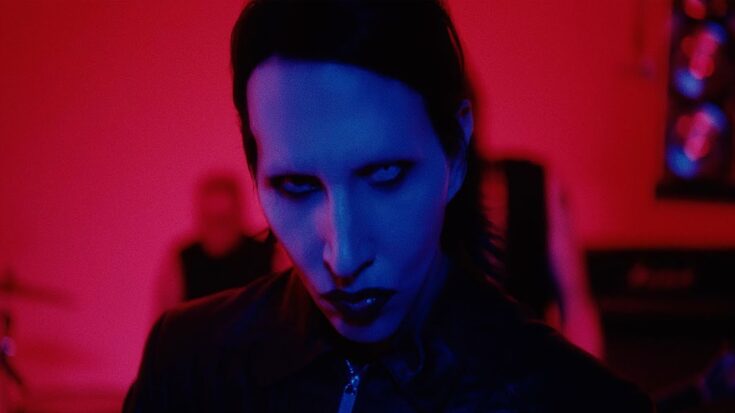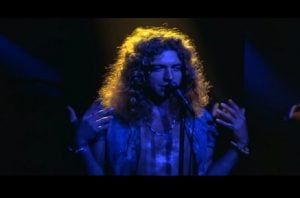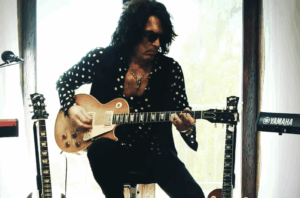Marilyn Manson Faces Backlash Over Ozzy Osbourne Video Message

via Marilyn Manson / YouTube
During Ozzy Osbourne’s final concert event, Back to the Beginning, a surprise video message from Marilyn Manson stirred up intense reactions. The footage, shared online by fans, was meant to celebrate Ozzy’s legacy but quickly became the focus of criticism. Manson, once a touring partner and longtime associate of Ozzy, praised the rock icon in a short recorded tribute.
In the video, Manson recounted his early fascination with Black Sabbath and the warnings he received about their music during his upbringing in a strict Christian environment. He credited Ozzy and the band as influences, expressing deep respect and admiration for the role they played in shaping his own path. His tone was warm and nostalgic, even affectionate.
But while Manson’s words were seemingly in the spirit of homage, the public response was far from receptive. The moment that was likely intended to honor Ozzy became a flashpoint for renewed criticism, largely centered on the serious allegations Manson has faced in recent years.
A Harsh Public Response
Almost immediately after the video aired, social media was ablaze with disapproval. Many fans took issue with Manson’s inclusion in such a high-profile tribute, citing the abuse allegations that have surrounded him in recent years. The backlash was visceral, with some fans expressing disgust and disbelief that he was featured at all.
One particularly pointed reaction came from a viewer on X (formerly Twitter), who wrote, “Eurgh Marilyn Manson making an appearance on the Sabbath stream. Fck that guy he’s a rpist piece of sh*t.” Others echoed the sentiment, linking his presence to broader issues within the music industry regarding accountability and public rehabilitation. The outrage wasn’t limited to Manson—Phil Anselmo’s appearance also drew heat, with another user commenting on the event’s lineup as a collection of “scumbags.”
This uproar reflects a growing refusal among fans to separate art from artist, especially when the artist in question is facing unresolved or controversial accusations. In the eyes of many, Manson’s appearance felt not just tone-deaf, but offensive—an unwanted reminder of the music world’s ongoing struggles with accountability.
View this post on Instagram
Manson and the Osbournes
Despite the criticism, Manson’s relationship with the Osbourne family has been a long-standing one. Sharon Osbourne, Ozzy’s wife and longtime manager, publicly defended Manson’s professional behavior amid the backlash. In a statement reported by Loudwire, she emphasized that she’s known him for over 25 years and described their working relationship as respectful and professional.
Sharon clarified that while she doesn’t speak for his personal life or the allegations against him, her personal experience with Manson has been positive. This statement seemed aimed at separating the personal from the professional, but it did little to calm the storm brewing online. For many, her defense came across as out of touch with the larger conversation around abuse in the music industry.
Manson and Ozzy’s history goes back to the late 1990s, when the two connected despite their contrasting images and musical backgrounds. Over time, they found common ground and mutual respect, often sharing stages and collaborating professionally. Their bond was more than superficial—it was rooted in shared struggles, longevity in the rock scene, and a deep understanding of the pressures of fame.
Art, Legacy, and Accountability
The controversy surrounding Manson’s video tribute to Ozzy underscores a much larger issue in today’s entertainment world: how should legacy artists handle long-term relationships in the face of new and serious allegations? While the tribute might have once been seen as a touching nod to a friendship, it was instead received as a misstep that ignored cultural and social realities.
It also raises questions about the nature of redemption and public appearances. Can an artist with unresolved allegations be included in major events without appearing to endorse or overlook the claims against them? The line between honoring a legacy and reopening wounds remains a difficult one to navigate.
In the end, Manson’s appearance was a reminder that history—musical or otherwise—is never free from context. His brief message reignited discussions that go far beyond a single tribute, touching on how the music industry, and its fans, are continuing to grapple with justice, loyalty, and the complicated legacies of its stars.
View this post on Instagram












